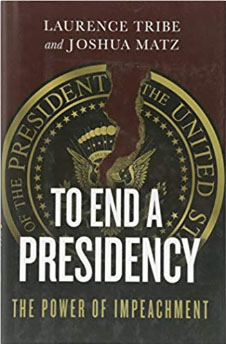— by Lin McNulty, Managing Editor —

To End a Presidency: The Power of Impeachment by Laurence Tribe and Joshua Matz (Basic Books, May 2018) has been on the market for just over a year, yet its historical perspective becomes more impactful with each passing tweet.
As challenging as it may be to read without being radically mindful of current events, Tribe and Matz adeptly step away from the political fray to look at the history of presidential impeachment and the future of our democracy’s ultimate sanction. No obvious political leanings of the authors are apparent; rather, it is a scholarly examination into the process provided by the Framers that has never removed a President from office.
The act of impeachment, as we are re-learning now, is, basically, an indictment by the U.S. House of Representatives that, upon passage, moves to the Senate for a full trial and, if so adjudicated, can result in removal of a U.S. President from office. Impeachment is not, as the sole responsibility of the House, the method by which a president is removed from office; it is merely the first step in an arduous process. It requires support from the citizenry for full implementation.
Tribe has recently made news with his legal opinion that the House may, indeed, vote to impeach, but rather than passing it on to a non-cooperative Senate, they could bundle up their indictment (impeachment) and present the case in court, thereby bypassing a non-cooperative Senate.
Laurence Henry Tribe is an American legal scholar who is the Carl M. Loeb University Professor at the Harvard Law School in Harvard University. Tribe’s scholarship focuses on American constitutional law. Joshua Matz is currently in private practice in Washington, DC. The team co-authored Uncertain Justice: The Roberts Court and the Constitution (Henry Holt & Co., 2014).









I find it interesting to note that Andrew Johnson, who took office upon Lincoln’s assassination, was the first president to be impeached by Congress. The impeachment failed to remove him from office by one vote, twice.
The law at issue in his impeachment was a technicality about whether or not he could replace a member of his cabinet. It also involved the examination of his bank accounts and whether he had obstructed justice in the trial of Jefferson Davis, President of the Southern secession.
But the real issue had to do with the meaning of “High Crimes and Misdemeanors.” For impeachment is not a legal exercise to be tried in the courts, though there are legal aspects. Impeachment is a political process by which Congress and the electorate hash out whether there has been a breach of contract, misconduct in office, that violates how we understand the President’s duties to the country.
President Johnson entered office after a civil war as a partisan, not as a peacemaker, exaggerating with his personal demeanor and legislative initiatives the divide in American culture that had just killed 750,000 people on our own soil [the equivalent to 7 million today].
Though President Andrew Johnson’s impeachment failed to remove him from office, the proceedings so exposed his bad faith as a leader, that he was basically laughed out of office losing legitimacy to all political factions.
As memories fade about the great conflicts in our time that have defined our democracy at home and on the world stage, we are once again confronted with the task of making current what that will mean in the lives of the next generations. Whether the current officeholder broke some law or other is not the point. It is that he served our interests as a nation of many parts, but one heart.
Democracy’s duty is not to winning the next election but to being that light on a hill, no matter the prevailing winds.